#Foreword - Lyrics
Explore tagged Tumblr posts
Text

Rocket by Tori Kelly
#tori kelly#tkellyedit#torikellyedit#lyrics#lyricsedit#rocket#foreword album#mine#edits#tori lyrics#mermaidinthecity
0 notes
Text
Arial

Photo by Kimberly Kiong
I wrote "The Sky" in Arial With 12-point font within The little circle we had drawn By the fence
In poster colours red and blue The clouds we softly dreamt Blushed in lighter hues In words of inky black
And in this machine Is a faint effigy Of the Sun In her garments of gold
But shrouded in dark There's a man with a lark Waiting for a hint Of her glow
Oh I recall the silver beams That held my frame of mind As they filtered through The spaces in the leaves
They underlined the cotton puffs In bolder strokes of grey That descended from the hills Into my arms
And in my resolve Though the Sun had dissolved Into the greying Thunderclouds
I stayed underneath A plain tarpaulin sheet Waiting for a glint Of her glow
Rearranging characters I chanced upon a fixed array Imaginary permanence The ending of a day
Italicised and justified Finality in disarray Crumbling like a statue or A thrown away bouquet
Left out to the elements The moss and moth have come to play No amount of vanity Can save what’s on display
0 notes
Text

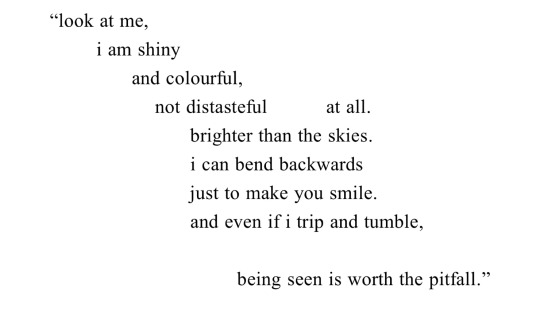

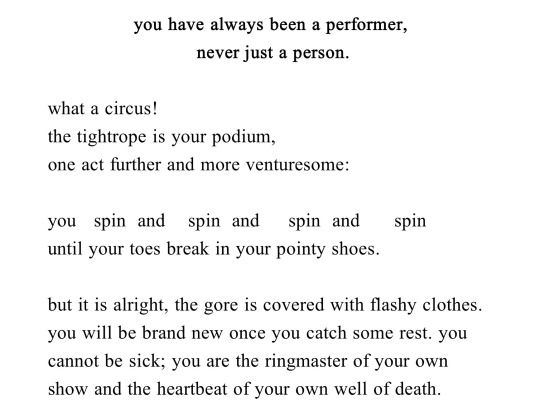

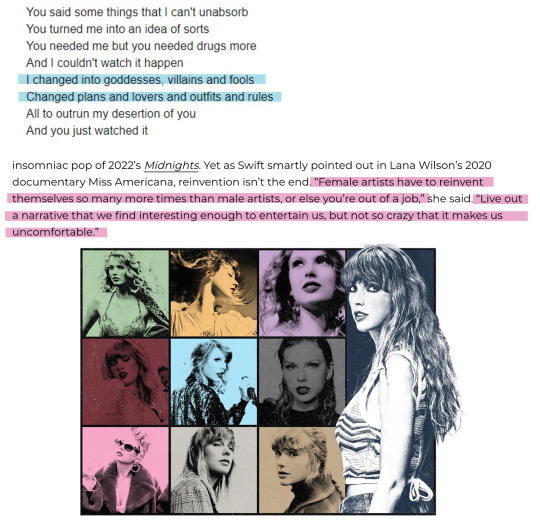


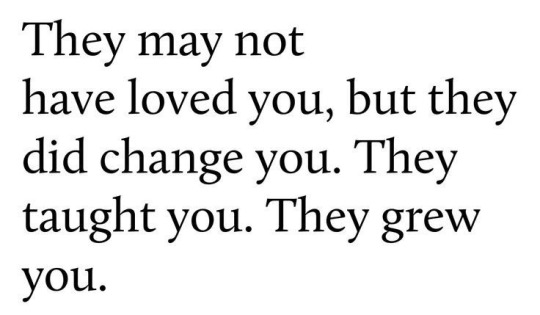

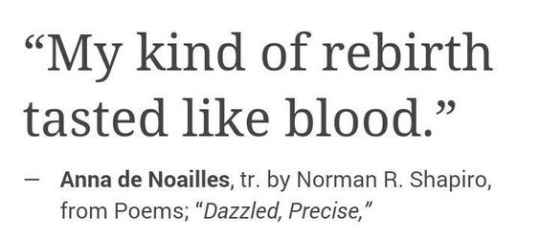
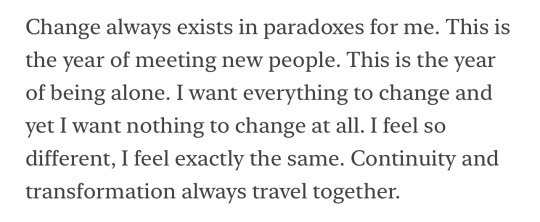

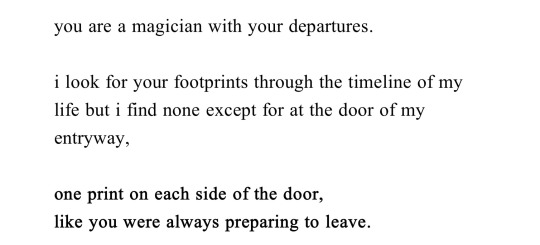

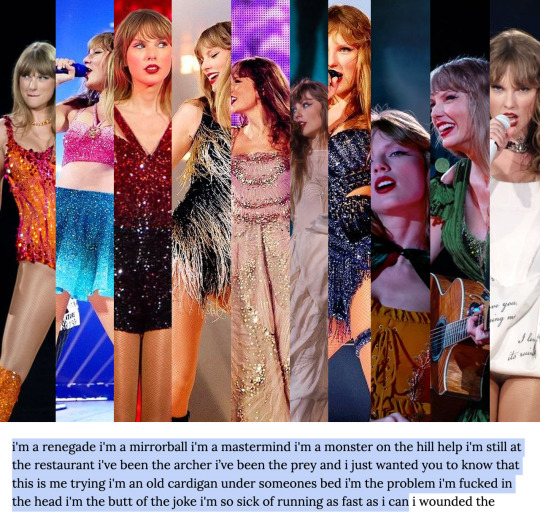
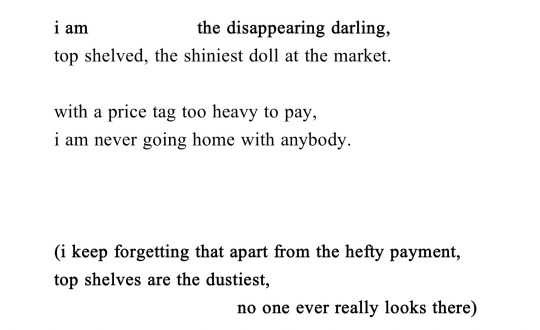


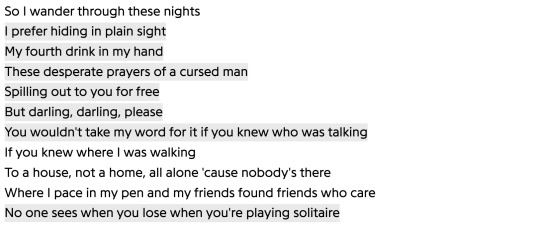







AND THEY NICKNAMED HER "THE BOLTER"
sources under the cut
mirrorball / you have always been a performer never just a person by fatima aamer bilal / who's afraid of little old me? / you have always been a performer never just a person by fatima aamer bilal / you're on your own, kid / mirrorball / i'll give you the sun by jandy nelson / chloe or sam or sophie or marcus / taylor in miss americana / you have always been a performer never just a person by fatima aamer bilal / midnight rain / bianca sparacino via the love journals / who's afraid of little old me? / dazzled, precise by anna de noailles / default states by nicole / mirrorball / you have always been a performer never just a person by fatima aamer bilal / dear reader / collection of taylor lyrics by me / you have always been a performer never just a person by fatima aamer bilal / my boy only breaks his favorite toys / castles crumbling / dear reader / midnights foreword / anti-hero / you have always been a performer never just a person by fatima aamer bilal / peace / you have always been a performer never just a person by fatima aamer bilal / the bolter / white horse / the lucky one / long story short / you have always been a performer never just a person by fatima aamer bilal / clara bow
#“town's number 1 entertainer cries herself to sleep because she is lonely even when she dreams”#hey quick question does it get lonely up there to where you fled?#taylor swift#web weaving#running#leaving#fame#the bolter#disappearing#performing#the eras tour#fatima aamer bilal#moony moonless sky#lillys weave of webs
190 notes
·
View notes
Text
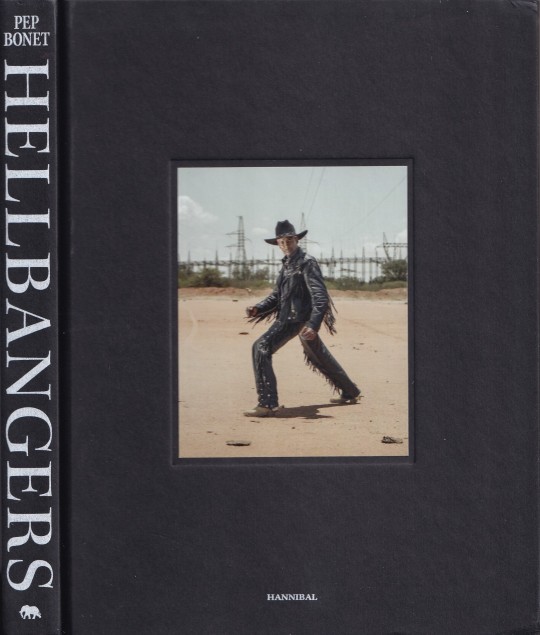





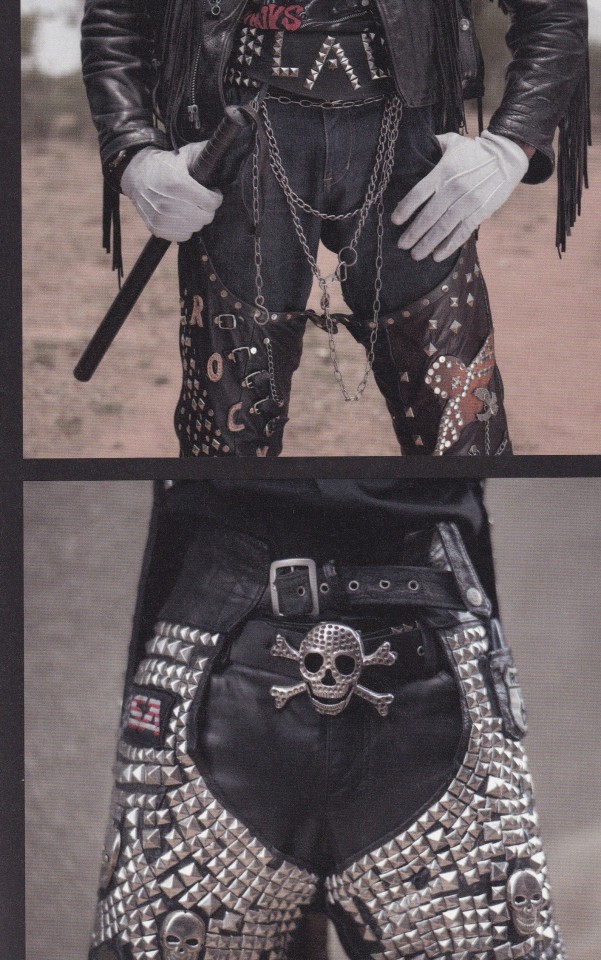
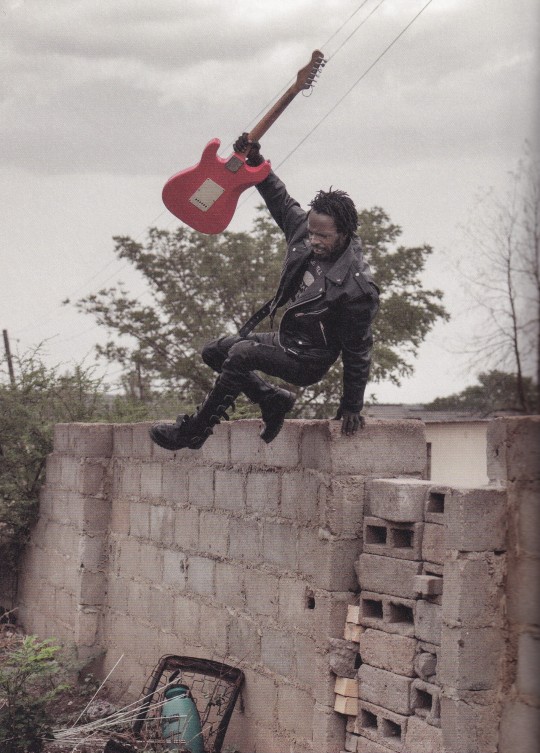


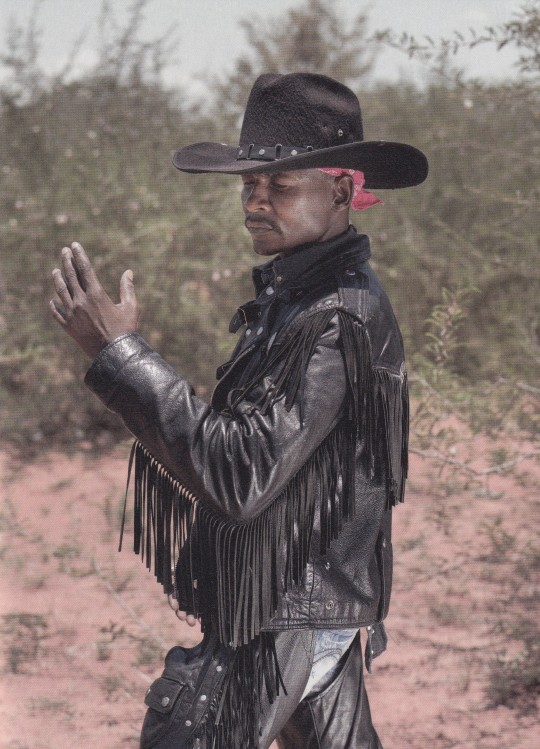
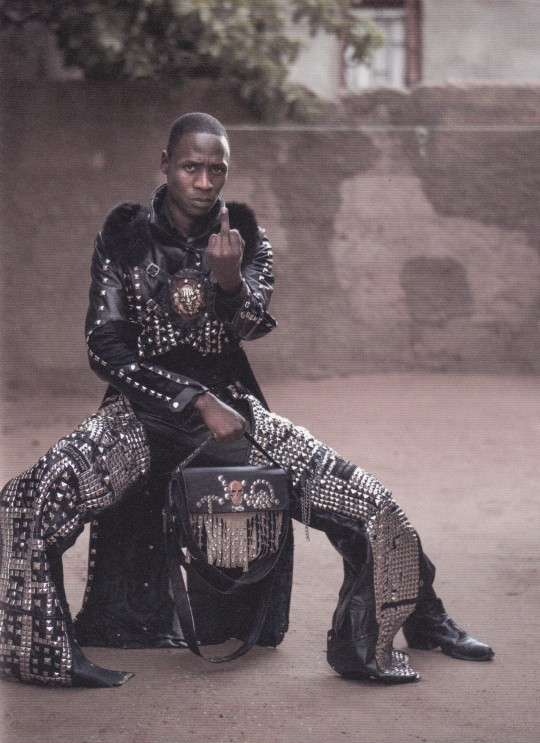
Hellbangers
Pep Bonet
Texts Pep Bonet and Steffan Chirazi, foreword by Rob Halford
Hannibal Books, Furnes 2021, 128 pages, 17x22 cm, hardcover with coloured edging, ISBN 978 916388 788 5
euro 60,00
email if you want to buy [email protected]
The Hellbangers are the enfants terribles of a sleepy, diamonds rich country. Photographer Pep Bonet (1974, Mallorca) has been following Overthrust, a heavy metal band from Botswana, Africa, and shows us a growing, exciting and thoroughly organic heavy metal community. Ten years ago, one group existed. Today there are more than ten and their fans are growing every year. The inhabitants of Botswana portrayed in this book are tattood, wear loudly and proudly leather jackets, leather trousers and play heavydeath metal music. Imagine the DIY ingenuity of their costume creation involving harvested animal skulls and other natural elements. With names like Demon and Gunsmoke, it would be easy though to think they are thugs, but We try to be exemples. Rock is awild thing, but also something for the heart, says Gunsmoke, the heavy metal head. Here too, the lyrics of the songs are very critical towards societies, just like their western peers. Metal in Botswana is rebellious movement against authorities. This is the story of what looks at first to be an unlikely union, yet one which powerfully illustrates how music, how heavy metal music, has become a positively unifying force in an unlikely part of the world.
28/12/23
305 notes
·
View notes
Text
It's a point countless others have already chimed in, but it does make me clench my fists not in anger, but out of pity, a bit when people say "The Divine Comedy was fanfic ahahaha" what Dante did was compose the way Busta Rhymes raps: In an incredibly complex manner. Except, while Busta does a song, Dante did an entire doorstopper of a book entirely in Terza Rima, which is the Italian equivalent of the escaping the Samsara just to show you could and then willingly reinserting yourself in it. Terza Rima is a complex rhyme scheme, and the entire damn book is written in it, something that becomes completely non-appreciable in other languages, except for the foreword of whoever translated any given version being something to the very polite effect of "I have no clue how he did an entire book of this, you will never understand the sheer testicular elephantitis of Dante Alighieri, just read the damn thing, I can't explain to you exactly how fucked up the original is" which obviously doesn't carry the same gravitas of 800-900 pages of rhyming in a specific style while telling the populace how you're besties with The Coolest Dude who took you on The Coolest Field Trip, and the trip was so cool that a lot of people just assumed it was canonical to the Bible Extended Universe, much to the dismay of men of the cloth all over.
I get comparing the self-insert/self-indulgent part, but I feel a bit of fist-clenching pity seeing an otherwise overarching, generalized comparison between "famed poet activated all of his syndromes and forgot to hold back to craft the weirdest combination of lyricism ever put on hardcover" and "form known mainly as the perfect marriage between the author wanting to see two characters from a show kiss and the author wanting to project trauma and/or touch starvation through popcorn prose", the latter of which is whatever and I don't mind in a vacuum and by itself, but does get a bit goofy if compared as intimately as the statement suggests with the former.
168 notes
·
View notes
Note
ok I need you to discuss this John is My Son thing because like I also feel that Sometimes I Felt Like His Priest is also really underdischssed!
okay here we go!!!
The quote you're referring to is from the Foreword of The Lyrics. I grabbed some more of it because it's all quite interesting to me.
This was about the same time that I met John Lennon, and it’s pretty clear now that we were a huge influence on each other. Readers might detect duelling emotions in my recollections of John; that’s because my relationship with him was very mixed. Sometimes it was filled with great love and admiration, but other times not, especially around the time The Beatles were breaking up. In the beginning, though, the relationship was a young Liverpool guy looking up to another guy a year and a half older. It was hard not to admire John’s wit and wisdom. But as I came to see him as a person and a human being, there were, of course, arguments, though never anything violent. There’s even a movie out there in which John’s character punches my character, but the truth is that he never punched me. As with many friendships, there were disputes and there were arguments, but not many. Sometimes, though, I certainly thought John was being a complete idiot. Even though I was younger, I would try to explain to him why he was being stupid and why something he’d done was so unlike him. I remember him saying things to me like, ‘You know, Paul, I worry about how people are gonna remember me when I die.’ Thoughts like that shocked me, and I’d reply, ‘Hold on; just hold it right there. People are going to think you were great, and you’ve already done enough work to demonstrate that.’ I often felt like I was his priest and would have to say, ‘My son, you’re great. Just don’t worry about that.’
It's like… there's so much going on here, you know? John is almost paradoxical to Paul: the source of one of the biggest hurts of his life and also one of his great bringers of joy; he's forever petrified as a teenager in Paul's mind and also on some level remains his fairground hero whose shadow Paul cannot escape; a traitor and yet don't you dare depict him being violent towards me; wise and simultaneously stupid.
At its root, I think many of these contradictions exist because Paul is on some level aware that a lot of the pain John dealt him was at least in part due to something John could not help (i.e. mental illness). He can't bring himself to blame John entirely, in a similar way a lot of us fans wrestle with John's behaviour that we know came from a place of great anguish. This has contributed to Paul infantilizing the memory of John; he has an instinct to look after John, and it's exacerbated by the fact that he has aged whilst his conception of John has not (you can see this in the way Paul constantly circles back to the early days of their friendship), which is in great contrast to Paul's memory of, say, Brian:
"I find that one of the interesting aspects of ageing: Brian Epstein never got beyond thirty-two, but I think of him as an older guy even though I’m already twenty years older than he ever got to be." – Many Years From Now.
But there's another element to this… A lot of people on here speculate about why Paul "can't get over John". My answer:
1) John's death was uniquely traumatic to John's loved ones in a way we tend to gloss over.
2) We are not letting Paul get over it! Paul has been asked about John in interview after interview for four decades and his image directly suffered due to the lionization of John post-1980 as well as the way he (Paul) was judged for not grieving correctly. Perhaps he's started bringing John up a lot in interviews in part because he feels he has to, lest he be deemed callous and cold again. (and perhaps he is seeking to nip the Lennon Question in the bud before the questions become, ahem, horribly insensitive) That's not to say Paul isn't weird about John – I think he is! But I think the way he's been made to both carry John's legacy and accept criticism used to build John up and bury his own unresolved anger at John and grieve over a senseless murder publicly and defend John now that his image is being torn down… it accounts for a huge chunk of this weirdness, IMO. Again, I want to reiterate: I think these are generally Paul's genuine feelings and thoughts (and I certainly don't want to imply that all of this only started post-1980... but perhaps there's a reason Paul seemed more measured throughout the '70s) but I think it's naive to act like society didn't help shape the way Paul talks about John and sees him. When you live as publicly as he does and your childhood friendship is one of the most talked about relationships in music history, you are bound to be affected by the general reception.
I also think Paul is often doing reputation damage control. It is very important to him that he and John are remembered first and foremost as friends (hence the offense he takes in the depiction of John punching him in Nowhere Boy) and it seems like, since at least Goldman, he's been trying to emphasize John's softer, more lovable traits. I think this, mixed with the infantilization mentioned above, is where you get stuff like the clip of Paul calling John a little baby or a lovely broth of a boy.
It's all so damn complicated you know? And so fascinating.
72 notes
·
View notes
Text
Foreword to Agatha All Along
After years of waiting, tomorrow witches, marks the anticipated start to Agatha All Along! But, before the first two episodes stream, it's time to take one last crack at discussing some possible theories (and hopes) for the series:
Akin to how Wandavision was an exploration of American Television sitcoms, this series is partially an exploration of depictions of witchcraft and referential to horror in pop culture (the Witched Witch and Glinda from the Wizard of Oz).
Is Rio dead? How does she seem to emerge from the ground on the side of the witches road? Did she and Agatha try to walk it long ago, and Rio perished, thus she is now trapped there forever?
At some point, Agatha will end up alone. She will be walking alone because either everyone has died, or those remaining leave. This however will not be indefinite.
Conversely, it could also recall the beginning when it was just her and the teen, but just the two of them make it out.
I keep thinking of that scene with her and the teen in the metal room, where they both appear to be in patient gowns. Are they in facilities at S.W.O.R.D.? Is the teen crying because Agatha is making him walk through memories and realize his identity?
Agatha's knowledge of the road is either from the Darkhold or what Evanora taught (or rather tried to keep from her daughter).
As a green witch, Rio is connected to plants. Her costume quite literally looks like vines and roots growing are forming the bodice. Are plants relevant in the sense of bloom and regeneration? Or rather decay and withering?
Using, dismantling, subverting, or cannonizing of symbols or tools of witchcraft. From kitschy to terrifying.
The hooded figures who appear in front of the teen, is there one for each member of the coven? Is it a haunted form of themselves, or a twisted appartion assigned to capture each?
Part of this story is found family, and Agatha's fear of comraderie. Built off a lifetime of distrust, backstabbing, and taking, Agatha has to learn to trust. In a similar vein, Agatha has no sense of comfort or home.
The scene where Agatha's face is covered in small cuts or splatters of blood. Either that is the cataylst to a glorifying rise near the end of the show, or a horrifying turn of seemingly irredemtion.
Rio was once Agatha's companion, her only companion. A betrayal between the two sent Agatha into permanent solitude.
I sincerely hope this show explores horror and gives into the darkness that Multiverse of Madness teased. Comic relief is a needed presence, but the tone is overall geared towards darker themes and storylines
Speaking of darkness - night! The majority of this series will take place at night! At least the juicy and important scenes.
DOES AGATHA POSSESS THE DARKHOLD AGAIN OR WAS ITS APPEARANCE IN A FLASHBACK
When Agatha was young and on the run, she was targeted for possessing the Darkhold.
Rio and Agatha...history may call them the best of friends.
The Ballad of the Witche's Road might be sung in several versions/genre's (we've already heard two)
More lyrics of the ballad will be revealed and sung as the story progresses.
The Witches Road may be terrible, but it is a unifying force as it welcomes everyone. Remember the lyrics: "Seekest thou the road, all that's foul and fair," the road is a living thing, inviting everyone but casting judgement on those who can achieve
I will cry at some point. I am certain this will break me just as Wandavision broke me.
The glowing tree in the middle of the Witch's Road has something hidden beneath and growing within the roots. (Is it the heart of the Road, because it is a living legend?)
Each of the witches will have to confront their greatest fears manifested as scenes, memories, or landscapes of their personal hells. Only when they begin to trust each other or confront/admit their weakness can their proceed. Agatha would obviously have the final and hardest challenge.
Without her magic, such a core tenant of her identity and confidence, Agatha will be even more combatative and threatening (borne entirely out of insecurity).
Agatha's cameo, and the lock of hair in it, is a reminder of her humanity and connection.
At some point, Agatha will break, spilling out centuries worth of every held back, messy emotion (and Kathryn Hahn will SERVE).
Perhaps it is based on the obvious Eve allegory, but there will be more biblical allegories or subversions. Is Agatha being born anew?
Teen and Señor Scratchy bond. It is likely a trauma bond. (The rabbit may also gain a more horrifying form or eat an entire monster/adversary)
Elaborate outfit reveal. ELABORATE FINALE COSTUME OUTFIT REVEAL! AGATHA ACHIEVES ENLIGHTMENT AND HER MOST POWERFUL FORM WHEN SHE FINALLY RECLAIMS HER MAGIC...possibly foiling Wanda when she became the Scarlet Witch.
This is not an exhaustive list, but it will be interesting to compare these ideas to how the show actually plays out. In all of this excitement, there is still a touch of trepidation. After pouring so much love into counting down the days to release and yielding art, writing, research, and costumes for this character, Agatha has remained a fun force of exploration and expression for me. However, the excitement over seeing where Kathryn Hahn takes the character next assuages any and all fears, as we finally will confront who exactly Agatha was all along.
Get ready witches, it's time to walk the road.
#agatha harkness#agatha all along#marvel#mcu fandom#marvel cinematic universe#house of harkness#hahndavision#coven of chaos#darkhold diaries#wandavision#kathryn hahn
27 notes
·
View notes
Text
"My Boy" (1973-1974)
Recorded on December 13, 1973 at Stax Studios, Memphis · Released on March 20, 1974 · Album: Good Times
MUSICIANS Guitar: James Burton, Johnny Christopher, Charlie Hodge. Bass: Norbert Putnam. Drums: Ronnie Tutt. Piano & Organ: David Briggs, Per-Erik Hallin. Vocals: Kathy Westmoreland, Mary (Jeannie) Greene, Mary Holladay, Susan Pilkington, Voice, J.D. Sumner & The Stamps. OVERDUBS Guitar: Dennis Linde, Alan Rush. Percussion: Rob Galbraith. Piano: Bobby Ogdin. Organ: Randy Cullers. Vocals: Ginger Holladay, Mary Holladay, Mary Cain.
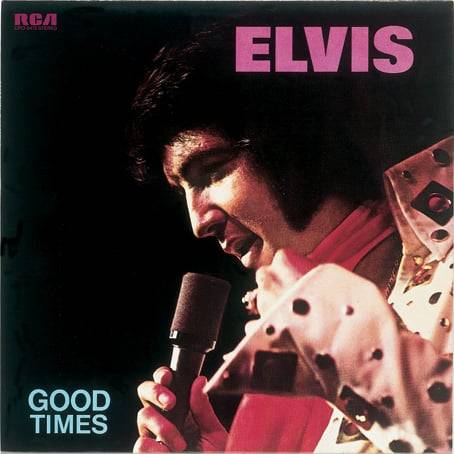
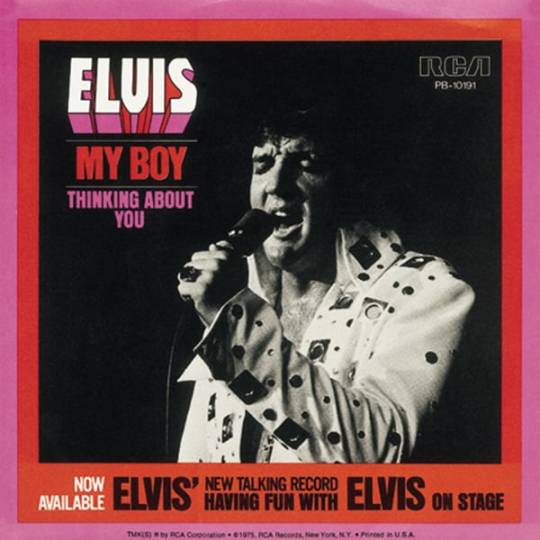
RELEASES In March 1974 "My Boy" was first released on the album "Good Times", and in January 1975 the song came out as Side-A single (backed with "Thinking About You".
youtube
The master of “My Boy” was lengthened by splicing on a repeat of the last section.
"MY BOY" — LYRICS Songwriters: Bill Martin/Phil Coulter/Claude Francois/Jean-Pierre Bourtayre You're sleeping son, I know But really, this can't wait I wanted to explain Before it gets too late For your mother and me Love has finally died This is no happy home But God knows how I've tried Because you're all I have, my boy You are my life, my pride, my joy And if I stay, I stay because of you, my boy I know it's hard to understand Why did we ever start? We're more like strangers now Each acting out a part I have laughed, I have cried I've lost every game Taken all I can take But I'll stay here just the same Because you're all I have, my boy You are my life, my pride, my joy And if I stay, I stay because of you, my boy Sleep on, you haven't heard a word Perhaps it's just as well Why spoil your little dreams Why put you through the hell Life is no fairy tale As one day you will know But now you're just a child I'll stay here and watch you grow Because you're all I have, my boy You are my life, my pride, my joy And if I stay, I stay because of you, my boy Because you're all I have, my boy You are my life, my pride, my joy And if I stay, I stay because of you, my boy Yeah, because you're all I have, my boy You are my life, my pride, my joy And if I stay, I stay because of you, my boy Oh, because you're all I have
--
TAKES · FROM FIRST TO MASTER
youtube
THE TAKE 2 Studio Sessions for RCA · December 13, 1973: Stax Studios, Memphis Please, read what Ernst Jorgensen says about the moment "My Boy" was being recorded, and listen to the take. -- The next night Elvis began with a song from his live repertoire, “My Boy,” which had been included in the August Las Vegas show. The song told the traumatic tale of losing a child through divorce, but Elvis wanted to be done with it fast. When Felton pushed for a third take, he exploded: “I told you to get this goddamn thing in two takes. I can’t sing it no more.” Take three was actually better; it lacked the long fade out Felton wanted, but he knew better than to ask for another, confident that he could loop it in mixing to get the effect he wanted. Excerpt: "Elvis Presley, A Life in Music: The Complete Recording Sessions" by Ernst Jorgensen. Foreword by Peter Guralnick (1998) -- So, when I first read this part of Jorgensen's book I hadn't listen to that take yet, but now that I did I don't take Elvis' comment as "he exploded", do you? If that was Elvis exploding, I have to reconsider a lot of the stories about his supposed short-tempered moments. Just saying. He sounded pretty like just casually commenting rather than snapping at Felton like the description of the moment made it look like. Still, I personally think that comment came for a reason, maybe EP was too polite - or too embarrassed - to show how affected by the lyrics of that song he was. Below is the take two alone, if you prefer to go straight to the point go to min. 3:50.
youtube
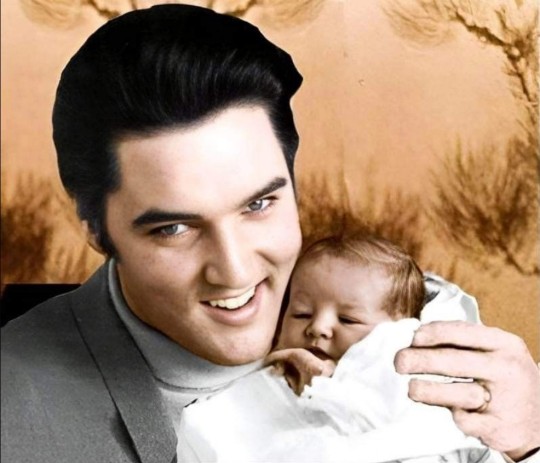
Elvis and Lisa Marie Presley at Baptist Memorial Hospital in Memphis, TN, on February, 1968. ♥
I must have been the only person in the fandom who hadn't seen this picture before. So cute! I'm meltinnnggg! Is it real? Looks edited, IDK. Anyway, what are your thoughts about Elvis' recording of My Boy? Do you think it had a meaning to him?
#elvis presley#elvis history#elvis music#elvis discography#good times#1974#elvis songs#“My Boy”#1975#elvis#elvis recording sessions#elvis at stax#70s elvis#elvis the king#Youtube#Spotify
21 notes
·
View notes
Note
Day Nine💖
(reminder that if anybody wants me to stop sending these asks at any time, just tell me and I will stop!)
what is the thing that you are the most passionate about in life and why? what sparked your interest in it? is their a goal with it you want to reach, and are you actively working on your passion, or is it just something you know a lot about?
It should be Jesus but I don’t think it is, not perfectly, not all the time. What I tell myself and others it is, most of the time, is “storytelling.” But what I think it actually is (most of the time, but not when I’m in the Spirit) is self-glorification and wanting to be famous.
So there’s the triple-nature. What I should be passionate about, what I want to be passionate about, what I am passionate about underneath it all. But only one of those things is going to actually endure, and it’s “what I should be passionate about.”
Anyway.
What sparked my interest in storytelling was a combo of factors, but I remember the exact moment it came together clearly. I was getting ready for church and I’d been up all night (because at this point in my life I was like 19 and having trouble sleeping was a thing.) And I was trying to decide what to do with my life. I had interest in animated movies and in counseling but I didn’t know what to go to college for, so I was taking a gap year.
And as I was getting ready for church my draft table had the “Lilo & Stitch: Collected Stories From the Film’s Creators” book open on it, and I was listening to a worship playlist in my room and thinking about movies, and thinking about telling some of the kids I worked with in student ministries what made Lilo & Stitch kind of a Gospel story and how I could tell that to them convincingly.

(This is not my picture, but the book looks like this.)
It was open to the producer’s foreword. And this song came on my playlist:
youtube
Which is about how God is the inventor and producer behind everything. It’s Tyler Joseph and Travis Whittaker. But I wasn’t familiar with this song yet, so I thought the lyrics were saying “You’re the author, the producer, the inventor of the scene.” It’s not, it’s “inventor of the seed,” but whatever, same principle.
Then like I was having some kind of dramatic realization, the vague idea that all of life was a movie God made, and the main point was Himself, and all man-made stories that were good had nuggets of that in them, clicked together. I had never thought of reality that way before.
And ll through that morning’s service and yammering to my mother at lunch afterward, I was just thinking thinking thinking about it. About how, in movies, the setting tells the story as much as the characters and events tell the story. (Stitch starts out in vast outer space where all the ships look vaguely like fish—then the scene transitions to a small, folksy town with a local feel, but still plenty of fish imagery.) And how, in God’s “movie,” the plants and the way they work tell the story of the Gospel. Seeds, growth, death, rebirth. How the seasons do the same thing. How the animals do the same thing—the freakin caterpillar is a crawling worm, then goes into a kind of death for a period of time, then comes out a new creation.
The art of storytelling, settings, characters, narrative, and all, is just a hobbled-together copy of how God has been communicating from the dawn of time.
And my brain was racing, and I remember thinking about the idea that Christians are supposed to be “little Christs.” Well, if He was THE storyteller who told His story to show us Himself, then what better could I do than be a little storyteller who showed people Him, too? Not just with my career and my writing and art, but with the way I obeyed Him with my life, obviously.
But that’s how I decided what to go to school for. And that’s what got me into the industry I’m in now.
All that to say, if there’s anything that is actually accurate about reality and God in my little “realization” or philosophy, it’s only because God showed it to me, not because I came up with it myself. And if it’s not accurate, He didn’t show it to me, I made it up and heaven help me. But so far I think He did show it to me, so I keep trying to tell stories without letting that become an idol.
#thanks for asking#asked#answered#me#storytelling#Christianity#lilo & stitch#seasons#Tyler Joseph#twenty one pilots
20 notes
·
View notes
Text
Tracklengths this, clad bow that. Why isn’t anyone talking about the foreword. Or the possibility of her bringing the liner notes back. The lyric booklet? The images? You guys.
#ts ttpd#ttpd#ttpd era#ttpd predictions#ttpd tracklist#taylor swift#it’s joever#taylor swift tour#the tortured poets department#eras tour#it’s so joever#the eras tour
24 notes
·
View notes
Text

The Pious Dance: The Adventure Story of a Young Man (1925) by Klaus Mann
“Perhaps no book needs to apologize more for its confusion at the very start than one which. . . deals with our younger generation and wants to be nothing more than an interpretation, expression, description and confession of that younger generation, its urgency, its perplexity—and perhaps its high hopes.”
Klaus Mann wrote these words in the Foreword to his first novel The Pious Dance which he subtitled “The Adventure Story of a Young Man.” Written in 1925, the novel chronicles the life of its autobiographical hero Andreas Magnus who, like Mann, was one of a generation of wistful and confused Weimar youth growing up after World War I had collapsed the ideals of European civilization. Mann was barely seventeen when he first arrived in Berlin in 1923, an event he described in his autobiography The Turning Point: “The city seemed both pitiful and enticing: gray, shabby, demoralized, but still vibratingwith nervous vitality, glistening, gleaming, phosphorizing, frantically animated, full of tensions and promise.”
It is against this mixture of squalor, flamboyance and creativity that Mann sets his tale of adolescent longing, its sexual ambiguities, impressionableness, intense emotionality and energy. Here impoverished young people dwelt on the fringes of the art world, big business, and criminal life. Berlin in the twenties has been much mythologized in painting, literature, and film, strikingly so in Cabaret,based on Christopher Isherwood’s Berlin Stories, which share the performance milieu of The Pious Dance. But Mann’s novel has few rivals that portray the gay underworld of its time. In many ways in The Pious Dance a son challenges the linkage of homosexuality and aestheticism that Klaus’s father, Thomas Mann, drew in Death in Venice. Andreas Magnus is more at home in the forest than at sea. His dance alludes to ecstacy in its ritualistic, mystical sense.
Nature, dreams, sexuality and art are inter twined as themes in The Pious Dance, as they are in virtually all works that, like this one, sit comfortably (or not), in the Bildungsroman tradition of German literature. The novel has a genuine lyrical freshness that at times lets go in passages of the most pressing emotion and lucidity.
If Klaus Mann’s early writings outline the agonized consciousness of brilliant youth, his later writings speak for the exiled and cultural¬ly uprooted German intellectuals who, likehimself, could find no comfort in the society ofnational socialism. He committed suicide in 1949. (Source: Blurb of the 1987 edition)
#classic#style#gay#art#gay writer#gay literature#lgbt#lgbt literature#gay history#lgbt history#klaus mann#the pious dance
16 notes
·
View notes
Text
You don't have to know exactly who you are. Just let your heart lead. Its so worth the trials that you're going through. So just enjoy the fall and you'll land right where you want to. Don't quit your daydream. Just take it slow. Don't forget to breathe. Who you wanna be is only up to you, it's only up to you. Sometimes, you may crawl, sometimes you may crawl, you gotta get back up again. Let them think that you're small 'cause it's so worth the fall when you land where you want to, oh. Baby, don't you ever quit it. Baby, you don't have to know exactly who you are. Because figuring it all out could be the best part, oh.
Daydream by Tori Kelly
0 notes
Text
Song of Sayings (by Sarah Lim)

Photo by Kimberly Kiong
They say The only way to mend a heart that’s torn in two Is to fill The gaps with someone new
I’ll pay A penny for your thoughts my dear and hope you’ll say That it’s not true It’s not true
For beyond the smokescreen of the sky There is a shadow of a doubt It follows me around
I know That we all have our wars to fight You have yours and I have mine They follow us all
They say That good things come to those who wait and so I will And so I have And so I shall until I fall
I’d pay To coin a phrase if only I knew what to say When the words Have all been said and done before
For beyond the smokescreen of the sky There is a shadow of a doubt It follows me around
I know That we all have our wars to fight You have yours and I have mine They follow us all
Throw a stone that bears my name Then fish it from its watery grave
They say That having faith can move the mountains, But mountains always move Slowly inching through space
I’ll say Come what may we’ll be okay when all is through Hearts will mend And words will heal and we’ll move on
For beyond the smokescreen of the sky There is a shadow of a doubt It follows me around
I know That we all have our wars to fight You have yours and I have mine They follow us all
0 notes
Text
Lockwood & Co characters as Taylor Swift albums, an unnecessarily long post.
Foreword: Let me just preface by saying I have been working on this for a long time. I think it's super fun to personify characters as ts albums cause they're all so different. While I know basically all of her songs are love songs, I always find a way to make them platonic as well, just an fyi. The format I'm using is I have two songs that are "honorable mentions", which are songs that I think fit, but not enough to crack the top list, also they don't have any specific lyric on why I chose them. "Honorable honorable mention" is the song that was just outside of the top 5, and they include a short lyric on why I picked them. The top 5 are in reverse order of how important I think they are, and how much they represent their characters. They have a long lyric on why I chose them. Of course this is all opinion based so no one get mad in my notes cause idc. Lots of spoilers from the books duh, so without further ado let's get into it.
Lockwood: Lover
I actually first started ponder this topic when I saw on tiktok that everyone was saying Lockwood was Reputation, and I just really disagree. Frankly I think Lockwood would believe he's Reputation, but truthfully he's Lover.
Lover represents so many things that are him. He believes himself to be too jaded and cold, but on the inside he cares so much. He wants to learn to love again, but he's scared of hurting people he cares about and he's afraid of getting hurt himself.
Honorable mentions: Lover and Soon You'll Get Better.
Lover represents how Lockwood always wants to love Lucy and he always wants to be so close to the rest of the crew as well. Regardless of his emotions and how he pushes them away, he wants nothing more than to be with them the rest of his life. He wants some to be there at every event, glory is nothing if he doesn't get to share it. Soon You'll Get Better feels like Lockwood trying to cope with not only his parents death, but also Jessicas. Before the crew came along he was all alone, and even when they are there he still stays in his own bubble. He wants to go back to the normal he had with his family, but he needs to realize that his new family is right before him, he just has to let them in.
Honorable honorable mention: Death by a Thousand Cuts - "I ask the traffic lights if i'll be alright"
This entire song is so Lockwood coded. It feels like when Lucy left and he doesn't know what to do without her gone, and it also feels like he's getting flashbacks to losing Jessica. I chose this specific lyric because it's more subtle and matches his emotions more. The actual lyric is a reference to being down in life and just taking everything as a sign. This really represents to me the period between THB and TCS where he was being so reckless, because he thought all of it was a sign since everyone he really loved had left him. And if that wasn't bad enough he was pushing away the few people he still had. Most of Lockwoods inner emotions seem to only get worse the more he keeps them in, in that way I think his demons are like his cuts. They're slowly picking away at him, even though there are people in front of him that could help.
Number 5: Afterglow - "Tells me this love is worth the fight, I lived like an island, punished you with silence"
This song and this lyric feels like Lockwood's struggle to learn how to deal with himself and his habits. He knows he shouldn't push all of them away, and yet he closes himself off to protect himself. He wants to fight for it all though, and he knows that doing so is worth it. He wants to let them all in, especially Lucy, and he does so slowly and on his own terms. He wants them to be patient and wait for him, and they will, because of course they will. I also feel like this lyric highlights how bad at communicating his emotions he is, but that he's aware of it and doing his best to try harder. I also love the second lyric because that's what Lockwood does. Yes he's just being private but it's obvious his silence can hurt them, especially Lucy. But by the end it's clear he's trying to be more open, even if it's painful, because he doesn't want to push them away.
Number 4: Cornelia Street - "Hope I never lose you, hope it never ends. I'd never walk Cornelia street again"
For all of them I think there's one song that really represents how their emotions might feel in retrospect, and for Lockwood it's this song. Cornelia Street is his Portland Row. When he was younger his family all lived there, and it was home, but when everyone died it was nothing but a shell of a time long gone. Now it's his home because the people that live there and visit make it so. This song and this lyric feel as if it's Lockwood bargaining. Because although he knows there will come a day where they aren't all how they are now, he wants to remember Portland Row as it is now. And that when everyone eventually leaves for one reason or another, it will once again not be a home, and he can never return. Though I think all of this is just his inner thoughts, because frankly I don't think any of them are ever leaving permanently. Portland Row isn't just his home, it's all of theirs.
Number 3: Cruel Summer - "Devils roll the dice, angels roll their eyes, what doesn't kill me makes me want you more"
I think both parts of these lyrics fit Lockwood so well, just in very different ways. The first part feels like a test of authority and the figures the world wants them to believe. Lockwood doesn't trust the big agencies, and any plans they make feel corrupt and cooperate, which are ideals polar opposite of Lockwoods. It also feels like it embodies the idea that Lockwood also has, in that you can't rely on supposed higher beings, but only on yourself, your allies, and your actions. The second half just feels like Lockwoods desperate love of Lucy. During TCS he was throwing himself at everything, and he put himself through it all just cause he wanted Lucy back. I just think this lyric really conveys how much he needs and wants her, even though he pretends otherwise. Lockwood just loves her so much and I'm obsessed with that. He feels like he shouldn't though, he's afraid of hurting her and himself, which is why he constantly pushes her away and denies his feelings.
Number 2: Daylight - "I once believed love would be black and white, but it's golden"
Don't get me started on Lockwood and daylight. To me daylight represents Lockwood learning to let himself love again, and to feel anything again. When he was young of course he was surrounded by it, but after being alone for so long, it's clear he tried to push any ounce of feelings away. Then along comes his crew, and as much as he tries to maintain his cool demeanor, it's impossible to deny how much he cares and how much he feels for them. Of course a big part of that is acceptance, and I think this lyric so perfectly illustrates this revelation he has. Love isn't black and white and pain and grief, but it's golden and it's sunlight in a bottle and it's all these feelings he never thought he'd feel again. To me this song represents the lighter side of Lockwood we never really talk about, it's in how he shows his love for the others. He sees the world as nothing more than a battle to be won, but it's clear he tries to shield them all from it. Daylight is about him learning to accept the world as it is, but it's also about how l&co lights it up for him.
Number 1: The Archer - "They see right through me, can you see right through me?”
Everyone's number one song is meant to represent their most inner thoughts and fears, and Lockwood is one of the most the archer characters to ever the archer, like it actually makes me sick. Yes I had to choose a lyric, but honestly the entire bridge and song in general is so him. The archer is everything Lockwood is doomed to be. He feels like he will never be enough, that none of his actions mean anything, and that he will be fighting for the rest of his life. But through it all his biggest concern is that his carefully placed facade is all for nothing, and that everyone he loves can see right through him. That they can see his doubts, and his flaws, and that they won't love him when they find out. Worst of all he's afraid he's too broken to hold on. So he holds his chin up and keeps fighting because that's all he knows, but deep down he is nothing more than the target of the archer. Lockwoods heroes, his parents, his old teacher, his sister, they died all alone. It's a fate he all but accepts in TEG. His sees death and combat like an old friend instead of an enemy. What he doesn't realize till much later is that his friends love him for him, flaws and all, and that these expectations he set up for himself hurt him more than anyone else. They all see right through him, but that's not a bad thing, it's actually a good thing. It's a keyhole to his soul, and how much he really loves all of them. I also love the lyric "help me hold onto you" because I think it really highlights how even though Lockwood pushes them away so much, he wants them to hold him tight and not let go. He needs them as much as they need him.
George: Midnights
Lemme just say that every single album I picked for the crew is probably gonna be a hot take, but I have so many reasons for all of them so hear me out. I stand by the fact that George is midnights and here's why.
Of course all of them are up late all of the time, it's their job, but for George it's just a little different. Midnight isn't so much of an annoyance as it is an old friend. His research is always his passion, and I think Midnights really represents that. Life can be filled with regret and apathy, but it can also be joyful and unexpected. That's what Midnights is about, and I think at his core George is the same.
Honorable mentions: Hits Different and The Great War
Hits Different represents George's struggle with change. Change is something most people do struggle with, but for George it's a little different. He tries to overanalyze every move, and in doing so he almost makes himself sadder, and trying to rationalize it doesn't make it any easier. The Great War is obviously a symbol of the fight l&co has against Fittes, but for George it's a little more. He barely reaches for help from the crew, and this represents his hesitation to ask for help or to let people in. It also highlights how even though he's afraid of letting them in, he's almost more afraid of losing them.
Honorable honorable mention: Lavender Haze - "I'm damned if I do give a damn what people say"
This lyric highlights how George is constantly in his own world, and that it's almost better that way. He lets strangers' words slide off his shoulders, and if he actually started to care what people thought of him it would be very difficult. Of course the crew's words get to him, but that's a given. I think this is especially shown through how much he dives into his research, and how most find him a little odd. Despite his unorthodox methods he usually gets his information, and the people that really matter to him don't mind. George is so bright, and under all of his layers or protection he's quite outspoken. Him staying steadfast on his own path is a key part of his character, and l&co's unwavering support of him is what eggs him on.
Number 5: Would've, Could've, Should've - "Now that I'm grown I'm scared of ghosts, memories feel like weapons"
This is George's retrospective song. George's whole life is the problem, more so than everyone else. It's not just his job, but finding the history of the problem is one of his greatest passions. But there will come a day when his talents fade, and even if his passion stays it will eventually become more fearful than exhilarating. Sometimes it can be harder to know what you're missing out on than never having it at all. In this way his memories and a time long past could haunt him, because as much as he tries he can never go back. It's also interesting because at the end of TEG the problem could be over, but no one really knows. He might spend his whole adulthood afraid of something no longer there. His memories contain all the fun times he had with l&co, but it could also serve a reminder of everything he's lost.
Number 4: Anti-Hero - "I have this thing where I get older, but just never wiser, midnights become my afternoons”
I think this entire song fits George so well, because it really pulls focus on how George believes he isn't a hero like the rest of the group. He keeps making the same mistakes and instead of being wise beyond his years like how Lockwood is per say, he's just normal. His brains are his strong suit, but I think he underestimates all of his other abilities because he believes himself to be incapable. As I said before all of them work at night, but the implication that midnights are his afternoons really works for George. I think it also does a good job of showcasing how locked in his work he can get, time always seems to pass him by. I also think the entire song really highlights how much like an outsider he feels sometimes, even within the group. He's afraid of how he acts when he's alone for too long, and I think this was really showcased in TCS when he was so inwardly angry about Lucy leaving. He sees himself as an Anti-Hero that is destined to be alone, even if that's the opposite of the truth.
Number 3: You're On Your Own Kid - "So make the friendship bracelets, take the moment and taste it”
While all of them have a retrospective song, I also feel like I gave all of them a more hopeful song. For Lockwood it was Daylight, and for George it's this. While YOYOK isn't a hopeful song, it's actually quite the opposite, I really wanted to focus on this specific lyric. I love this for George because to me it represents his growth in letting himself be emotional. He's so used to being an outsider and an oddball in any group he's in, and so naturally he's very closed off, and he doesn't want to let anyone in. He was very close with Lucy in THB, but then she left and he closed back off, but by the end of the series it's easy to see how he has changed. This lyric represents his ability to finally let himself live in the moment, to love without fear of losing, to enjoy the little things, and to be his authentic self. Maybe he's on his own, and all of this happiness is just temporary. Or maybe this group is his family for life, and all he has to do is lean on their shoulders. I think this song highlights how he is only as alone as he makes himself, because with l&co he'll never truly be alone.
Number 2: Dear Reader - "Where I pace in my pen and my friends found friends who care”
Dear Reader embodies George's doubt within l&co. I think it really manifests how his own doubts can really get to his head, and this is especially highlighted in the whispering skull (more so the show but I loved that arc they gave him). To him it can feel like he's an outsider in his own home, in his family, with his friends. When Lockwood and Lucy really get comfy in their feelings, it ends up with him pushed to the side. This entire song is so him, he's trying so hard to keep it together, to not make the wrong decisions, but he's human so of course he messes up. In a way it also feels like he's telling himself not to do certain things just because he's afraid of how that could hurt him. In his mind he's nothing more than the brains, and at times he believes himself to be expendable. He had Lockwood when he had no one, but now Lockwood has Lucy, so where does that leave him? But the truth is there's enough room for all of them. His friends might've found friends who care, but that doesn't mean they don't still care about him. He's so afraid of losing so he locks himself in, he never even plays the game, but as said in the last song he does learn to let himself be vulnerable. It's just a matter of getting over that hurdle himself.
Number 1: Mastermind - "No one wanted to play with me as a little kid, so I’ve been scheming like a criminal ever since”
This song as a whole might not really represent George, because him meeting the crew was nothing but luck, but the bridge. Oh my god that sells it all. Not to mention the title, it's so him. He is the mastermind of the group, Lockwood might be the glue that holds them all together, but George is the building blocks that let them get so far. In the books George isn't given most of a backstory, but the show fills that in. He didn't fit in with his family, and it's clear he's had a hard time with friendships. I think he uses his smarts as a shield, as a plan even. No one wanted to be friends with him when he was younger, but that didn't bother him. His ambitions were far greater, he wanted it all. Also this goes back to the thought that I think George sees himself as an anti-hero. His scheming, his plans, they are all just him, but not something malicious. Yet as he grew up he realized he did want people around, and not just anyone, but l&co. I also love the lyric "I'm only cryptic and Machiavellian cause I care", like that's SO George. He realized he does care, even if it's in own unique way, and thus maybe he'd even allow himself to let his guard down. He wants them to love him and for it to be without struggle, but struggle is only normal. And they do love him, flaws and all, so perhaps the real way he's a mastermind is finally realizing that everything he needs is right in front of him.
Lucy: Speak Now
Yes yes another hot take I know. I also know this might be my oddest choice, but let me cook. Speak now is a lot more upbeat then one might expect for Lucy, but being upbeat doesn't mean always happy. While this album might not be what you expect on the surface, it really represents Lucy deep down.
Speak Now is TS's first album to depart from her more optimistic tone, and that seriousness masked as being normal is so Lucy. Lucy always pretends like everything is fine, like every little thing doesn't get to her, but it does. This entire album has such a melancholy tone, it deals so much with regret and longing. All very Lucy things, so let's get into it.
Honorable mentions: Superman and Never Grow Up
Superman embodies Lucy's fears with her friends always being in danger, particularly Lockwood. She's terrified of something happening to them, and she doesn't want to lose them like she lost Nori. Of course she wants them to go out and save the world, but it's scary not having control of their fates. This is really highlighted in THB because she leaves over worry of Lockwood and his recklessness. Never Grow Up fits Lucy in a bit a different way. Rather than the song focusing on her childhood, I really think this is how she feels with l&co. This is a melancholy song for her, because obviously l&co won't stay together forever, and it's scary knowing their time is on a timer. She's afraid of growing up and getting older because her identity is tied to her talents and to her friends.
Honorable honorable mention: Ours - "People throw rocks at things that shine"
I think this lyric really fits the situations l&co constantly find themselves in. They're dangerous and most of the time they're in places they shouldn't be, and yet they all still come out victorious. Not to mention Lucy's talents being as exceptional as they are, it's only normal that others will try to tear them down. The reason this is interesting is cause they're not even at the top, every victory is a battle, and sometimes being the underdog means you shine even brighter. Kipps' crew in the beginning, and then Fittes and Marissa as a whole are constantly trying to make sure they stay in their place. They throw their rocks at them but l&co, particularly Lockwood, never really listens, and because of all of their defiance they get results others couldn't even imagine. I would say this is Lucy's hopeful song, even if it's more like perseverance.
Number 5: Back to December - "I go back to December all the time, it turns out freedom aint nothing but missin you”
This entire song is Lucy during the period between THB and TCS, her freelance era if you will. She's alone and she's lonely and she constantly reminisces on her time with l&co. She misses them so much, but she stays away because she thinks she's protecting Lockwood. Her supposed freedom really just has a cloud over it though, she longs for what she left but she's convinced herself that she can't go back. I love the way this song talks about the distance between the two of them, and how it acknowledges that Lucy knows she's in the wrong, but that she acted the way she did because she thought it was for the best. I also think this song really represents the "what ifs". Like perhaps in a world where Lucy never went back to l&co. All of them would be worse for wear, because they need each other, especially Lockwood. I just think it acknowledges everyone's hesitation towards each other in the beginning of TCS.
Number 4: Electric Touch - "Got a history of stories ending sadly, still hoping the fire won’t burn me”
Lucy is forever plagued by how her employment with Jacob's, especially in the show when it was clear she was close with the other trainees. So when she comes to l&co she obviously wants things to be different. But George is distant and Lockwood is reckless and it terrifies her. She thinks her story can only end in tragedy, and that maybe this bad luck follows her. It's part of the reason she leaves in THB, so doesn't want that same fate to fall upon them. I know the fire in this song has a different context, but to me I think it represents her hope. She doesn't want the hope she has to hurt her in the end, she wants to stay positive, but she's conflicted on if she's asking for too much. She loves all of them so deeply, and she wants nothing more than for them to be ok, even if that means she's not a part of the story anymore. Though her plans of leaving to protect Lockwood kinda have the opposite effect, and that drives her up the wall.
Number 3: Enchanted - "This is me praying that this was the very first page, not where the storyline ends”
Enchanted is soooo how Lucy feels about Lockwood, but I also think it represents way more than that. It represents Lucy's doubts about not just Lockwood, but about the whole crew, and even herself. It's about how Lucy has always felt like she had to put up a front with others, and then suddenly she met Lockwood. But it wasn't just him, eventually George and her opened up to each other. Then she puts her hatred aside for Holly, and she even gets close to Kipps. The entire crew became her family, and she realized she could actually be herself around them, no front. She doesn't want their time together to be on a timer, she doesn't want the story to end anytime soon, because it's so clear they all mean the world to her. Also I think this song does a good job of telling how captivated Lucy was with Lockwood when they first met. She was enchanted to meet up, and her pounder if he loves her like she loves him is a sub plot of quite literally the entire series. I also think this song can represent how she thought getting along with the crew would be smooth sailing at first, when in actuality it was very bumpy. But that's ok.
Number 2: Long Live - "For a moment a band of thieves in ripped up jeans got to rule the world”
This song really represents the crew as a whole, but I think it more specifically describes Lucy's viewpoint of it all. Lucy wants to remember these moments, the good and the bad, because for once they win. Another lyric that fits is "the end of decade, but the start of an age". They ended a massive piece of history, but likely started a new era from the small glimpses of the future we got in TEG. Lucy wants to remember when they broke all the rules and fought for what was right. In that sense I think this is her retrospective song, because yes it represents how she feels now, but I think it better represents how she might feel years from now. I chose this specific lyric because this is soooo the crew. They're a band of sometimes thieves and nobodys who ruled the world if only for a moment. I also love the ripped up jeans line cause I think it really represents how scuffed they kinda are. They're just kids, they're amateurs in the eyes of adults, yet they're the ones who actually did something. I also love the lyric "I had the time of my life fighting dragons with you". I think this embodies that even though they were fighting against ghosts every day, they had the time of their lives cause they had each other. So in that way it's also her hopeful song.
Number 1: Castles Crumbling - "Here I sit alone behind walls of regret, falling down like promises that I never kept”
Castles Crumbling is so Lucy it kinda hurts. I think it really represents her dreams as well as her doubts. She wants l&co to be an "empire", but again not because of the glory, but because she wants to succeed with them side by side. This song really embodies how she thinks she is holding them back, and not just that, she thinks she's putting them all at more risk because of her talents. She's scared of being the problem and letting them down, and more so of ruining everything they've been working so hard to achieve. The particular lyric I chose represents her fears of never following through. She was supposed to come to London with Norrie and work at a big agency, but she let Norrie down in her eyes. She fears she is doing the same to l&co. So she puts herself behind a wall, afraid of hurting those she cares about. Her regrets haunt her every day, even if she wants to move past them and learn to forgive herself. She thinks she can't keep her promises, and because of that her entire world feels like it's crumbling. She doesn't want to ruin everyone else's world as well. I think this song particularly matches THB. Lucy has a perfectly crafted well and area she keeps to herself, but when Lockwood gets too close she gets scared. She's afraid of his reckless nature, and even more afraid of what he would do for her. Lucy can't have another person die for her, and she will destroy the castles herself if she has too.
Holly: Red
Originally I had Holly as 1989, and it wasn't till I had fully planned this and was writing everything out that I changed my mind. The songs I picked weren't fitting how I wanted them too, and when I was going through Red I realized how much more this matched her. Also I find this a little funny since the color I picked for her is also red.
Red is more of a departure from country compared to TS's first three albums. It has a more mature and reflective tone overall, and it really embodies Holly's contemplation. I even think it represents her constant confusion in the state of the world, and even her relationships with l&co at times. Red is her questions materialized.
Honorable mentions: Everything Has Changed and Stay Stay Stay
Everything Has Changed feels like when Holly finally gets to know the crew a little better. I doubt it was as instantaneous as the song implies, but it's the idea that Holly wakes up one day and decides that she wants to be more than coworkers with them. She wants to get to know them better, and she wants to be less closed off as well. I think it's when Holly learns to find another home in not just Portland Row, but the people in it. Stay Stay Stay has a similar vibe, but it's more like the crew's response. It's the revelation that they care as much as she does because they have taken the time to get to know her. I think it's also her realizing that no one else has loved her like this before, and it's hard for her to process. I think this is particularly relevant in TEG since by then they're all close, and her and Lucy are finally on good terms.
Honorable honorable mention: Holy Ground - "For the first time, I had something to lose”
I know this lyric says for the first time, but in Holly's lense it's more like the re-realization that she has something to lose. Some people don't like that Holly's back story is so similar to Lucy's but I love it cause it's such an interesting character study. Anyways, Holly lost her whole team to a ghost when she was Rotwell and I think it's pretty clear that she has been running from that her whole life, as it's evident she keeps l&co at a polite distance in the beginning. Likely to protect herself from getting hurt again through attachment. I love this lyric cause it's kinda her lightbulb moment, which personally I think likely happened towards the end of TCS. She saw that she actually has something to lose again, and that thought is terrifying. Yet it's not like she runs away from it, she actually leans into it. It's clear she won't let her fear of loss stop her from loving so freely again.
Number 5: The Very First Night - "Back then we didn’t know we were built to fall apart, we broke the status quo”
So much of this song feels like it's how Holly would feel years down the line. I think it's her retrospective song, but it's a little less depressing. Almost like all of their pains and fights were just part of growing up. They were built to fall apart but they were also made to come back to each other. They're all such a vital piece of the puzzle, and yes they can sometimes drive each other crazy, but it's so clear how much they love each other. I also love the second part of the lyric, because l&co broke like every status quo they could. They were a small independent agency with no supervisors and they were always in places they shouldn't be. They were constantly getting into trouble, but then again that's why they got results. I also just like how it feels like Holly coming to accept their odd style of doing everything, like yes they're a mess but man they're her mess and she loves them anyways.
Number 4: Come Back...Be Here - "The feeling you can know so much without knowing anything at all”
My god this specific lyric is so Holly. I think it so perfectly represents her fear as well as the crews fear about the problem. They know so much about it, yet nothing at all, and after Marissa reveals herself they realize they know even less than they thought. They have all spent their entire lives fighting ghosts and while they might've forged bravely through the dark, they had only scratched the surface of the entire conspiracy. It's a daunting reality, to realize you have been fighting your whole life for nothing. To realize you've lost so many people just because of the selfish ambitions of others. I also think this could just apply to her life outside the problem. She's one of the older ones of the group, but it's easy to see how she hides her insecurities behind a smile. It must be hard seeing everyone else so sure of themselves and their mission, and yet feeling like you don't fit in anywhere. It's easy to feel for her, especially when Lucy is so mean to her in the beginning. She's just trying to find her place too.
Number 3: Treacherous - "This path is reckless, this slope is treacherous, and I like it”
Treacherous feels like it captures Holly's somewhat rare but still reoccurring passionate and spontaneous side. I feel like this song embodies Holly learning to go with the flow with l&co. When she first joined she was uptight and hesitant no doubt, which is understandable considering she came from a fancy agency like Rotwell. She questions a lot of their methods and their cases, and just everything really. She was hesitant to rush in and to trust, which is again understandable. Yet over the course of the books she slowly learns to embrace all of these things. She learns to trust Lockwood like the rest of them, she learns to be more open hearted even if it might bring pain. She learns to love again at her own pace and in her own way, because subtly is everything in these books. She never has some dramatic moment, but it's the small ones that really show how much she has changed. She doesn't hesitate to do things for the rest of them when they're in trouble, she learns not to think twice about leaping when it matters. Because even if she falls, she knows they'll hold her hand and help her up.
Number 2: Begin Again - "Thinking all love ever does is break and burn and end, but in a cafe I watched it begin again”
This whole concept is Holly embodied, it kinda makes my heart hurt. This is like the second part of Holy Ground in her story, because it's her learning to embrace that she has something to lose. Instead of that being a bad thing, it becomes a good thing, because she realizes that she can begin again, and that her life wasn't over when her team at Rotwell died. Also I just love the cafe line because all I think about is how they all went to a cafe at the end of TEG and they were laughing and having a great time together because they won, I think that moment truthfully solidified her feelings. Because she had opened her heart and let people in, she found out that love can begin again, just like she once had too. I also just love the idea of her accepting that everything happens for a reason. Of course that's not saying she wanted what happened, but it's more so her learning to roll with the punches, and embrace whatever life gives her. It also just feels so gentle and careful, and I'm not saying Holly is always like that, cause boy that girl can be a spitfire, but her experiences feel so different from the crew. She doesn't know if love is golden or carefree or anything, but I think she's starting to understand what it means for her.
Number 1: Nothing New - "They shoot you down and then they sigh and say, “she looks like she’s been through it”
I think this song represents the life she has lived so well. The agency, and the problem, and all of her losses were shots. She was down and yet the world wondered how she could be so caught up. I think it really highlighted a problem represented within all the agencies. They see their agents like machines instead of people, which is why l&co was so night and day for her. But even being with them didn't erase all of her doubts. She felt like she knew everything when she was at Rotwell and yet at l&co it's like she knows nothing. Not literally of course, but of how the world works and about how she feels and deals with all of it. She's afraid of time passing her by, because frankly she's still trying to figure out who she is without the problem, which is a hard task for all of them. She wonders how long it'll be till she's replaced with the next best person, because even if that's not how l&co works, that's certainly how the other agencies work. I think that's why she likes to do her own stuff, she wants to be a secretary, not a soldier for a cause she doesn't understand. She wonders if her novelty will wear off, and if she'll still be valuable if she's not new. What she doesn't fully understand till later is that l&co doesn't value her for that, but for her as a person and for the skills she brings to the table.
Kipps: Folklore
Kipps was hard to pinpoint for me at first. I had bounced around a lot of ideas, but it was only after finishing the books and listening to Folklore that it all pieced together. Folklore is really sad, probably TS's saddest and my god if that isn't Kipps.
Folklore is based on characters and fiction rather than real life like TS previous albums, but it still has hard hitting themes. It explores escapism, nostalgia, and just a lot of emotions. All of the things Kipps pretends not to acknowledge, even if they plague his life on the daily. This album is just so him, and honestly it was hard to narrow down the song list, because he fit so many of them.
Honorable mentions: August and Exile
August in its totality doesn't really fit Kipps, but the bridge, ah it always comes down to the bridge. It's like Kipps reminiscing about the time in his life when he was so sure of himself. Everything around him was enough, because he was so confident in tomorrow. But then the future became nothing more than something to dread. Exile is Kipps' understanding of the cycle that he is a part of. I think this revelation really occurs in book three when Ned dies. Kipps realizes that he's just a cog in the machine, and that his death would be as insignificant as Ned's. Because the only people that remember Ned are his friends and family, sacrifice has become a normality instead of a tragedy. Kipps realizes the normal ending agents get will never change unless he does something about it.
Honorable honorable mention: My Tears Ricochet - "I can go anywhere I want, just not home”
This lyric is straight to the point and to the heart. We never really learn any of Kipp's backstory, we only know about his life within his talents and Fittes. Which in this case really fits. These lyrics scream book four Kipps, but honestly it also represents him as a whole. After he finally leaves Fittes it's like he has no home anymore, but what really made him feel at home was his talents, and those are long gone. He can't go home cause his talents are faded, he can't go home because he finally sees Fittes for what it is, and he can't go home to Portland Row because he's afraid to feel that way. We don't know about his childhood, but since he's "grown" he can't go home there either. In a way he's stuck in limbo, trying to find the best way out but trusting none of the options. It's a perfect tragedy that would end if he stopped thinking about it so much.
Number 5: Mirrorball - "I’m still a believer and I don’t know why, I’ve never been a natural all I do is try try try”
Kipps has every reason to believe in Fittes. He was a child prodigy, a top advisor, the picture of natural success there. Yet of course the more he learns, the more he starts to question his beliefs. Through it all though it's clear he wants to believe Fittes and agencies aren't all that bad, he wants for his doubts to be soothed. Eventually though it's evident that almost everything he ever knew was a lie. This revelation starts in book three, but it goes all the way to the end really. Though book four does hone in on this a lot because we see Kipps try to grapple with the institution he once worshiped, and it's here we see him question why he ever believed in them. The second line of the lyrics feels like Kipps' life outside of the problem. Within it he's a natural, he was the best of the best, but it's kinda clear that everywhere else he's strugglingly. Socially he's not that great, and it becomes abundantly apparent to him that there's no point in trying so hard if all he'll ever do is fail.
Number 4: Epiphany - "Just one single glimpse of relief to make some sense of what you’ve seen”
This song feels like Kipps's attempt at bargaining with the problem, specifically it's inception. This whole song fits so well because it describes the world around like a war, and what are agents if not soldiers. He wants all the horrors and tragedies he's witnessed to have a logical explanation, he wants it all to make sense, for it to not be as bad as sounds, but it's worse. Marissa and Tom's greed led to the deaths of millions of people and thousands of agents. This song also represents Kipps fatigue in always having to fight. We think he's just a coward and a cynic, mainly in the first two books, but it becomes clear later on that he only acts like that because inside he's so tired and conflicted. He's tired of fighting a never ending war, he's tired of getting new teammates because they keep dying, he's tired of always dealing with loss, of never being able to get away from it. Truthfully there's no explanation that could make it ok. Frankly Kipps doesn't really have a true retrospective song, because all of his are kinda already that way. This is the closest one to narrowing it down.
Number 3: Cardigan - "Cause I knew everything when I was young, I knew I’d curse you for the longest time”
So many little lyrics in the song fit Kipps so well. I love the juxtaposition of the lyrics. About society saying you know nothing when you're young, versus feeling like that's the only time you did know something. That's exactly how Kipps feels. Everything now is so uncertain, but back then? He ruled the world. Yet even though children are the key to fighting the problem, they are constantly discredited by adults. Adults who only want to stay in power, and who don't really care who fights ghosts, only that they fall into line. The second part of the lyric fits in a different way. It feels like Kipps finally acknowledging why he hated l&co so much. He hated them so much because they were everything he longed to be. They were successful, in the peak of their talent, and most of all they had their whole lives ahead of them. He was on the decline, and they all had each other, while he felt utterly alone. How could he not hate them? It was so clear they were going to change the world while he got left behind, but luckily for everyone he had a different fate in store.
Number 2: Invisible String - "Isn’t it just so pretty to think, all along there was some invisible string, tying you to me”
As always I have a passion for making romantic songs platonic and this is a prime example. This song represents Kipps coming to terms with the fact that he ended up exactly where he needed to be. This is his hopeful song, and it also feels like him coming to realization that it all worked out. First off let me just say I love how this song uses colors to describe things, because that's exactly what the show did with the trio and their costumes. In a way it feels like Kipps trying to deny that he was meant to be with them, but all along their paths kept crossing, almost like he was destined to end up with them. His invisible string wasn't tied to a specific person, but the group as a whole. I love how the second chorus talks about time in a love/hate kinda way. Kipps is grateful for time because he has learned so much about himself and the world, and yet he hates it because it never stops, no matter how much he despises or cherishes a moment. I also love how the bridge describes past mistakes like barbed wire, threatening to hold him back, but that this invisible string is a spot of gold lighting his way. Kipps had every chance to regress but chose not to with the love and support from the crew, they made him see how everything he needed was right in front of him.
Number 1: This Is Me Trying - "I was so ahead of the curve, the curve became a sphere”
My god this entire song is so Kipps I might be sick. This whole song represents Kipps coming to terms with not only his talents fading, but how that has affected his relationships and the way he acts. The first verse talks about having a hard time adjusting, of acknowledging change, fears and regrets. It represents Kipps coming to terms with falling off, but it's more so his regret of letting fear take over his life. He eventually fights that, and even if he never knows how to make the first step, he eventually finds his way back to the people he loves. Verse two is just a mess because god it's so him. He feels like he wasted his potential, and that because he rose so high, he had the furthest to fall. It's also like him acknowledging how vindictive and mean he can be, and it also represents his fear to really open up to anyone. Which makes sense considering how much he pushed aside l&co in the beginning, he was trying to pretend like he didn't need them when that's the opposite of the truth. The ending is Kipps' confession that living and moving on can be so difficult. How is he supposed to get over the only thing he was ever good at? So he tries and tries to be better, even if he feels like it's all in vain. The reality is that his efforts were enough, because even when he was completely useless to the crew they loved him anyway.
Final thoughts:
Honestly never in a million years did I think I would write so much lmao, I didn't realize I had that much to say. Well thank you if you've read this far, makes me feel not so alone in my unhealthy obsession over these characters. I love them so much, and having a way to express that always feel nice.
I also never expected that I would write the most about Lucy, like yes she's the main character but still. The real shocker though was how much I wrote about Holly, sure it's only third longest now, but I had to shorten it like crazy y'all don't even know. Anyways, can't wait for the next inevitable l&co essay lmao.
#lockwood and co#l&co#lockwood netflix#lockwood & co#anthony lockwood#lucy carlyle#george karim#holly munro#quill kipps#taylor swift#3 weeks of writing later#and over 8k words later#I'm insane...but I'm free#they are my pookies forever and always
23 notes
·
View notes
Text
when she played all too well live during the red tour and frequently seemed on the brink of tears and when she chose to play it at the grammys despite it never being a single
when she wrote "these songs were once about my life. they are now about yours" in the foreword to her next album
when she said "you turned this song into a collage of memories of watching you scream the words to this song, or seeing pictures that you post to me of you haven written words to this song in your diary, or you showing me your wrist, and you have a tattoo of the lyrics to this song underneath your skin"
and when she said "that is how you have changed the song ‘all too well’ for me"
and when the all too well 10 minute version music video ended with the readers making that story their own
and now. "but the story isn't mine anymore."
#taylor swift#the tortured poets department#ttpd#the manuscript#taylor text posts#yumi lives in delusion
16 notes
·
View notes
Text

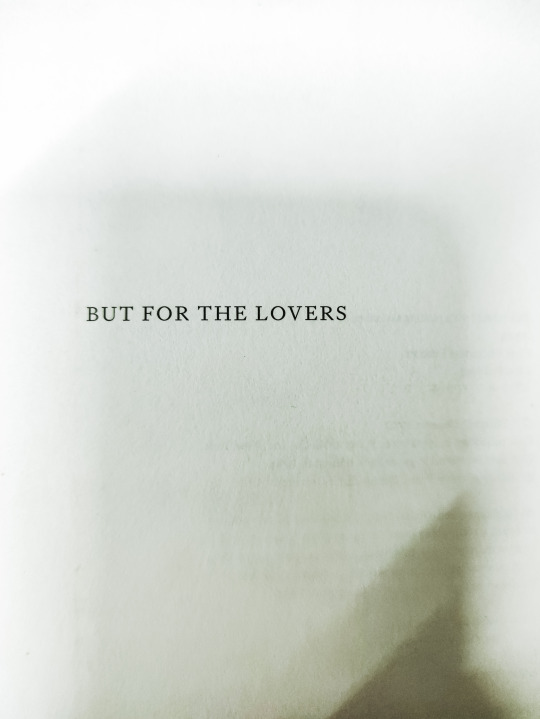
This is perhaps my most anticipated read of the year, and I’m happy to report that it did not disappoint. This novel has a lyrical, almost feverish prose that is brutal in (a lot of!) places. If you do not like flowery writing, I don’t think you’ll appreciate this.
On a sentence level, “But for the Lovers” demands a lot from the reader. The prose is dizzying, challenging, and is rife with code-switching. It is not a book that will coddle purely English speakers, which I laud. In the novel's foreword, Gina Apostol wrote that every time the Filipino employs the English language, the purpose is always subversion. BftL perfectly demonstrates this point. The way Nolledo used English in this book is very Filipino and very weaponized. And as I read, I got the sense that he was having a lot of fun writing this masterpiece. This book is not an easy read, but one that is worth the trudge.
So what is it about? “But for the Lovers” follows a cast of characters living in a rundown tenement building in a Japanese-occupied Manila at the tail end of World War II. This is a war novel with much waiting; the characters await their American “liberators.” And the reader waits too—knowing full well that when Americans do finally arrive, Manila will be razed to the ground.
The way Nolledo employs language in this book is really unique. It reads a lot like magical realism with its lyrical and flowery prose, but this book is very much grounded. And brutal. The seemingly magical things are actually happening in the physical world. For example, the opening sentence reads: “He was beginning to eat flowers, and the crescent moon was in his eyes when he awoke again.” It sounds a lot like a work of magical realism. But later in the chapter, we find that the man was literally eating flowers because he passed out under a flowering tree. And when he awoke, he saw the crescent moon. This push and pull of seemingly fantastical language against the physicality of the scenes continues throughout the novel. In magical realism, the fantastical elements are also usually employed to shield against the brutality of the physical world. In Nolledo’s novel, the brutality of the physical world disrupts the reader's enjoyment of its fantastical language. When brutality happens to the characters, it punches you in the gut.
So much trust is put in the ability of the reader. Whenever a chapter opens, the reader is plunged into the middle of the narrative and is expected to make sense of what’s happening—who’s the speaker in this chapter? Where am I? What is happening? And it’s only in the latter part of the chapter where things will start to make sense. Then, you’re on to a new chapter, and the disorientation starts again. I enjoyed trudging through the book, but can understand why people may be turned off by that.
Another marvel of this novel is that from start to finish, everything moves parallel along two realms: this is a physical novel, but it’s also very much an allegorical one. This beautifully reflects the poetic quality of our history and experiences. Of how we always seem to repeat the mistakes of the past. Of how, many years later, we seem to find ourselves in the same situations. And if we extend this to the rise of the Marcoses and the historical revisionism happening in the present… hay nako.
Which leads me to the way Nolledo wrote the novel's climactic moment: this war novel culminates in an overlap of memories. The parallel sentences hone in on the point that things that have happened before will happen again. America fooled us twice—first when they colonized us in 1899 and now in 1945 as they shelled Manila to the ground—both done in the pretense of being our liberators.
I found the allegories too in the nose at first. But thinking about it now, I’m glad the subtexts are simple and obvious, because the text itself is already challenging enough. Kung mahirap pa pati subtext san na lang ako pupulutin?
Some things I did not enjoy: I did not like the dream sequences in this novel. I did not like the woman (or, in the case of BftL, girl) as a nation trope employed. Especially since the waif who is the stand-in for the nation is worse than Maria Clara in Rizal’s novels. I don’t appreciate the sexist language (i.e., penetration), especially around the awakening of the nation’s soul. That said, I forgive Nolledo for his sexism. He’s a genius but still very much a product of his time.
The novel ends on a hopeful note, a promise of becoming, of blossoming for this nation. (Reading it today under another Marcos administration is bleak and depressing.) But one has to hold on to hope.
This novel is breathtaking, audacious, and blatantly anti-imperialist. It also tells us that the poor, the masa, carry the nation’s soul—not the educated middle class, not the wealthy landowners, not the ruthless authoritarians in power. But for the Lovers is a challenging read, but one that is well worth your time.
More photos from the book on my Instagram!
36 notes
·
View notes